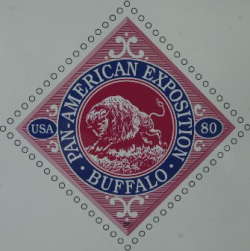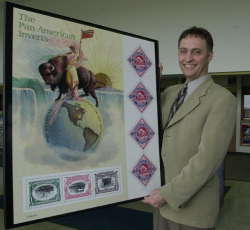

Flawed Pan-Am stamp is a cause for celebration
By DOUGLAS TURNER
News Washington Bureau Chief
3/28/2001
WASHINGTON - Stamp collecting is the only industry built around renowned government blunders, and one of the government's biggest stumbles will be celebrated Thursday in Buffalo and on Manhattan's West side.
It will be the unveiling of the U.S. Postal Service reissue of the famed "Pan-American "Inverts' " - a series of stamps printed upside down at the U.S. Bureau of Printing and Engraving a century ago. Just one of the original inverted 2-cent stamps issued to observe the opening of the Pan-American Exposition in Buffalo in 1901 is now worth $42,500. As few as 55 of those stamps are in existence today.
The new set of Pan-American Inverts, as they are known in the stamp collecting trade, will be the highlight of a four-day, $500,000 show put on in New York City by the Postal Service and the American Stamp Dealers Association. About 10,000 commercial stamp dealers, collectors and hobbyists will attend the highly publicized show at Passenger Ship Terminal Pier 92.
The Buffalo observance Thursday will be a more modest celebration, staged at the Buffalo and Erie County Historical Society. It will feature a song composed for the centennial of the Pan-Am and speeches by Mayor Anthony M. Masiello and others. No refreshments or finger foods are included in the tight budget for Buffalo.
"I guess we're not the main player," said Sally Treanor of the Historical Society.
In fact, there would be no federally sanctioned observance
in Buffalo at all were it not for a lot of jawboning by the Erie County congressional
delegation. Last fall, aides to Rep. John J. LaFalce, D-Town of Tonawanda, complained
to
Postal Service headquarters that because Buffalo was the site of the Pan-American
Exposition and the reissue celebrates that event, the home city and not New
York should have been where the party was held. Rep. Thomas M. Reynolds,
R-Clarence, beefed, too. Finally, Rep. Jack Quinn, R-Hamburg, wrote an
uncharacteristically stern letter to
Postmaster General William J. Henderson on Jan. 30.
"I am deeply concerned that these events would be scheduled anywhere but the site of the Pan-American Exposition," Quinn wrote. "I urge your reconsideration of this decision."
In a slight exaggeration, Quinn told the postmaster, "Many sites constructed for the exposition . . . remain."
The only remnants are the Historical Society building, which was the New York State hall, and a gazebolike structure discovered in West Seneca recently, which will be on exhibit at the Historical Society.
Despite the congressional protests, the Postal Service refused to move the unveiling from New York to Buffalo and merely added a Buffalo unveiling as a deliberately understated appendage.
"The ceremony should last no more than 30 minutes," Buffalo Postmaster Donald L. Gross said in a response to Quinn.
The Postal Service, an independent spin-off of the federal government, also refused to yield to protests from Reynolds' office that the Buffalo ceremony even be mentioned in the service's long new release about the Manhattan event that is posted on the Postal Service's Web site.
The Postal Service hopes to recoup all of the $400,000 to $500,000 it is spending in New York from food concessionaires, exhibitor booth rentals and sales of the replica sheets, according to Ken Martin, convention director for the American Philatelic Society.
alo, the program begins at 1 p.m. Thursday. The City Honors Chorale will perform the national anthem and a new composition honoring the Pan-American Exposition, called "A Bright and Shining Light," written by Kathleen Vogel Mathews.
LaFalce is scheduled to speak, but aides said he may have to be in Washington for a vote. Others on the program include Gross, and William H. Siener, executive director of the Historical Society.
Ann Conable, spokeswoman for the Historical Society, said the event can be considered a preliminary to the major centennial observances in Buffalo that will begin May 5.
The Postal Service on Thursday will bring facilities to officially cancel the new sheet of stamps, which will also include three 80-cent issues. These were printed at a plant at Brown's Summit, N.C.
A sheet of the replicas will cost $3.27.
 |
 |